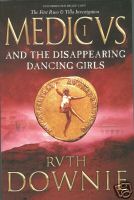Medicus
 A very kind friend of mine has lent me her proof copy of Ruth Downie's debut novel Medicus and the Disappearing Dancing girls. Set in Britain in 117AD, it's billed as a detective story (The First Ruso and Tilla Investigation), but the focus is very much on setting the scene, so that there's lots of human interplay and detail. It also has a wry sense of humour, and is very much a page-turner.
A very kind friend of mine has lent me her proof copy of Ruth Downie's debut novel Medicus and the Disappearing Dancing girls. Set in Britain in 117AD, it's billed as a detective story (The First Ruso and Tilla Investigation), but the focus is very much on setting the scene, so that there's lots of human interplay and detail. It also has a wry sense of humour, and is very much a page-turner.I wonder, if like Simon Scarrow, Downie was encouraged to make it a detective story, because crimes sell (apparently). But never mind. The chapters are short and punchy. The dialogue is easy on the soul (no trying to make it picaresque, hurrah). There is a good sense of difference (religion, different peoples) and familarity - the way people behave, but also admin-heavy parallels are drawn with the NHS, for example. No material culture gaffs either, or anything else that offendeth mine archaeological sensibilities. I could just settle in and read without getting tripped up. Strangely, the very distinctive opening lines from Downie's original short story from which this was developed, have been changed. It was surely what caught an agent's and/or publisher's eye initially. I really enjoyed this novel, and would definitely recommend it, and will read the sequels.
PS An excerpt can be read here.

8 Comments:
"I wonder, if like Simon Scarrow, Downie was encouraged to make it a detective story, because crimes sell (apparently)."
Good question, Alex. The original chapters won the very first HNS Solander writing competition way back in 1997, which was for a romantic historical novel (and judged by Elizabeth Chadwick) way back in 1997. I've been wondering if Ruth Downie was encouraged to make it a detective story to compete with Lindsey Davis (or jump into the gap she left whilst taking time out from her annual Falco novels). If so, does this mean publishers perceive that historical crime sells better than historical romance? Hmm. Am I bovvered? Are you bovvered?
Last year Lindsey Davis told the Romantic Novelists' Association that she felt that the Falco books were fundamentally romantic, a sentiment with which I fully agree.
I'm not sure whether crime does sell better than romance (which, broadly defined, accounts for about 25% of UK fiction sales) but I suspect that it has a sharper profile. Bookshops tend to have crime sections, and not either romance or historical sections. Perhaps the publishers of Davis, Scarrow and Downie feel that there is something to be gained from their books coming out of the main shelving, and into the smaller crime corner.
Incidentally, the Crime Writers' Association are on Uni Challenge next week...
There are no historical sections ins UK booskstores? I know they don't have them in the US but I thought the genre was popular enough in the UK to get its own shelves. Here in Germany, they pretty much rival the Fantasy/SciFi ones and if not for Robert Jordan, the hist fic shelves would be the larger ones. ;)
No historical sections in the UK (that I know of)- you have to know already who you're looking for, or just be up for a good browse. They are either in the main stream section, with all the other fiction, or sometimes in the Sci-Fi/Fantasy section. For example, Bernard Cornwell, Simon Scarrow, Elizabeth Chadwick can be found with contemporary stuff, whereas Helen Hollick and Jack Whyte are in the Sci-Fi Fantasy section. Oh, and Borders has a Romance section, so sometimes one can find stuff there too. And then of course there's the aforementioned crime section to check out. HF fans in the UK have to be very on the ball.
Soc Antiqs were on Univ Challenge last night. They were up against the Bodleian. Haven't seen it yet, but my money is on the librarians ...
Will answer Sarah's query later.
Same's true for the US, incidentally, Alex. They put Hollick and Whyte in the SF/F section, even though as far as I know, the fantasy content in both is minimal or nonexistent (haven't read much Whyte).
Must brush up on my German. I need more good HF to read :)
I think there may be a tendency to assume that all Arthurian stories = fantasy. So many Arthur novels feature druids and mystic priestesses that you can see their point:-) So our local library shelves Helen Hollick's Arthur trilogy as SFF but puts 'Harold' and 'Hollow Crown' in HF, presumably because their subject isn't Arthur.
To be honest, Jack Whyte's book *should* be in the fantasy section, as I'm afraid his settings don't tally with the archaeology (to say the least), but Helen Hollick's Arthur books should be a ringer for at least the same place as Cornwell, Chadwick, et al. Ah, I'm confused ;-)
Looks interesting. I'm glad they are still publishing new "Roman" authors as someone told me the market was saturated so obviously this is not the case.
Post a Comment
<< Home